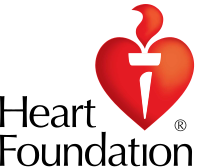National Heart Foundation of Australia
This article needs additional citations for verification. (April 2013) |
 | |
| Founded | 1959 |
|---|---|
| Registration no. | ABN 98 008 419 761 |
Area served | Commonwealth of Australia |
Key people | Chief Executive Officer Ms Mary Barry |
| Revenue | A$66,458,745 (2011) [1] |
| Employees | 288 (2011) [1] |
| Website | www |
The National Heart Foundation of Australia (known as the Heart Foundation) is a charity established in 1959. Its stated vision is for Australians to have the best cardiovascular health in the world and its mission is to reduce suffering and death from heart, stroke and blood vessel disease in Australia. Its activities have been funding cardiovascular research, supporting health professionals in their practice, developing health promotion activities, informing and educating the public, and assisting people with cardiovascular disease.
The Heart Foundation claims its work has helped to reduce the number of deaths from cardiovascular disease. Cardiovascular disease (CVD) accounted for nearly 34 per cent of all deaths in 2008. This translates to one person dying from CVD on average every 11 minutes. Heart disease is the leading single cause of death with more than 23,600 Australian lives lost to the disease in 2008.
The Heart Foundation has offices in each state and territory.
History
The organisation emerged after tuberculosis had been effectively removed as a health concern and after the successful establishment of the Heart and Stroke Foundation of Canada. A group of concerned Sydney professionals meet with the trustees of R.T Hall Trust and members of the New South Wales government health services in July 1958 where they decided to form the National Heart Foundation of Australia.[2]
Programs
Supporting and informing
The Heart Foundation provides people with, and at risk of, cardiovascular disease information and guidance on how to minimise their risk. Annually, the organisation distributes more than 1.3 million heart health brochures. Each year, the Heart Foundation’s information service and its website provides heart health information to thousands of Australians.
Partnerships
The Heart Foundation supports and works with all levels of government, other health organisations, the media and community groups and food manufacturers to implement policies and programmes that attempt to improve the cardiovascular health of Australians. This includes programmes on cardiovascular health risks such as smoking or physical inactivity, through to recovery and rehabilitation and diet.
Improving care
The Heart Foundation claims to take the latest research and creates practical treatment tools for health practitioners. The Heart Foundation attempts to bridge gaps in care through programs specifically targeting those Australians at higher risk of cardiovascular disease.
Building healthy communities
The Heart Foundation supports local governments that change neighbourhoods to create healthier communities. Initiatives by councils, such as building cycleways and upgrading walking paths are eligible for Heart Foundation Local Government Awards (to be renamed Heart Foundation Healthy Community Awards in 2011).
Promoting awareness
Through community education campaigns and media activities, the Heart Foundation promotes lifestyle changes to improve the heart health of Australians. Recent examples include the Warning Signs campaign, which raises awareness of the symptoms of a heart attack and of the need to phone 000 so that sufferers can get early treatment to have the best chance for survival.
Criticisms
The Heart Foundation has been criticised by professional dieticians, food nutrition experts and lay researchers for having a conflict of interest especially with regard to their Heart Tick food labeling fund raiser in conjunction with food manufacturers and government vested interests.[3][4] They state the Heart Foundation has ignored recent significant nutritional intervention studies and other nutritional research on cardiovascular risk. They observe the coincidence of carbohydrate rich diets with the obesity and insulin resistant diabetes epidemics of the last 5 decades, both risk factors for cardiovascular disease.[5][6][7][8] The Heart and Stroke Foundation of Canada abandoned a similar program which had endorsed some sugar rich products.[9][10] The Heart Foundation's response was to review the program with a survey while consulting with other "stakeholders" in the Australian Government's planned Health Star rating system.[11]
See also
References
- ^ a b "2011 Annual Report and Financial Statement - National" (PDF). National Heart Foundation of Australia. 13 April 2012. Retrieved 16 April 2013.
- ^ Milton James, Lewis. The People's Health: Public Health in Australia, 1950 to the Present. Greenwood Publishing Group. p. 50. ISBN 0313320454. Retrieved 16 April 2013.
- ^ "25 years of Heart Foundation Tick". Heartfoundation.org.au. Retrieved 15 November 2014.
- ^ "ANNUAL REPORT 2013" (PDF). Heartfoundation.org.au. Retrieved 15 November 2014.
- ^ "Trends in Intake of Energy and Macronutrients --- United States, 1971--2000". http://www.cdc.gov/mmwr/preview/mmwrhtml/mm5304a3.htm. CDC. Retrieved 17 November 2014.
{{cite web}}: External link in|website= - ^ Prasad, SB; Fahrtash, F; Malaiapan, Y; Meredith, IT; Cameron, J (29 October 2010). "Obesity and the metabolic syndrome in patients with acute myocardial infarction". International journal of cardiology. 144 (3): 450–1. doi:10.1016/j.ijcard.2009.03.089. PMID 19356813.
- ^ Thomsen, Mette; Nordestgaard, Børge G. (1 January 2014). "Myocardial Infarction and Ischemic Heart Disease in Overweight and Obesity With and Without Metabolic Syndrome". JAMA Internal Medicine. 174 (1): 15. doi:10.1001/jamainternmed.2013.10522.
- ^ "Pete Evans backs petition to scrap Heart Foundation's healthy tick". News.com.au. 9 October 2014.
- ^ "Weighty Matters". http://www.weightymatters.ca/2008/01/what-can-you-do-about-health-check.html.
{{cite web}}: External link in|website= - ^ "health check exit". http://www.healthcheck.org/story/health-check-exit.
{{cite web}}: External link in|website= - ^ "Department of Health". Health.gov.au. Retrieved 15 November 2014.
